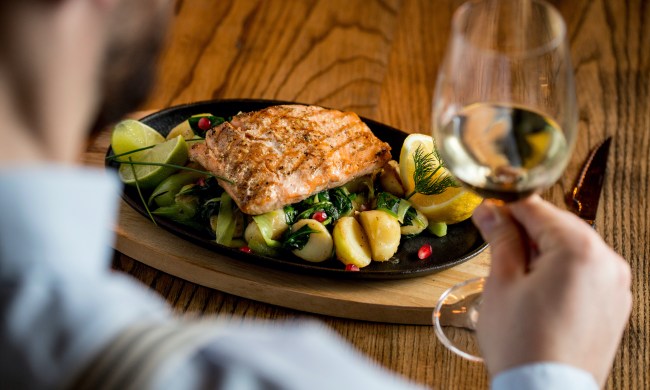One might opt for non-alcoholic wine for many reasons. Whether it be sobriety, health-related issues, religious beliefs, pregnancy, or anything else, the reason is no one’s business but the drinker’s. For several reasons, more and more people are choosing to drink less or not at all, and that is a beautifully courageous choice, no matter the reason. Having a nonalcoholic option that isn’t simply soda or juice can make a person who isn’t drinking feel more included in the festivities, which should always be the goal. So whether you’re choosing to cut down on alcohol yourself or want a more inclusive bar cart, we salute you.
These are our top favorite choices for best non-alcoholic wine.
How is non-alcoholic wine made?

While it has only come into the spotlight in recent years, nonalcoholic wine has been around since 1908, when it was invented by Carl Jung Jr. The Jung family owned a vineyard in Germany’s Rhine region and started to notice that business was gradually slowing as customers began drinking less. Jung decided it was time to experiment and got to work with his father’s equipment to make wine without alcohol. It was a success. In 1908, he filed a patent for his new winemaking process, and non-alcoholic wine was born. Today, the process is much more advanced and complex than Jung’s original system, but without it, we might never have had nonalcoholic wine.
Today, non-alcoholic wine is made using the same method as traditional wine, but the alcohol is removed in the final stages of the process. This is done using one of two methods: vacuum distillation or reverse osmosis.
Vacuum distillation
In this process, wine is heated in a vacuum to evaporate the alcohol, which is condensed and collected separately from the wine. While this method effectively removes alcohol, it can also remove some of the wine’s unique flavors and aromas, which is part of the reason non-alcoholic wine has such a different flavor and body than traditional wine.
Reverse osmosis
The reverse osmosis process, also known as filtration, involves forcing wine through a membrane using tremendous amounts of high pressure. This process creates two separate liquids—one of concentrated wine and one of alcohol and water. The concentrated wine is left without the alcohol and can be consumed on its own.
Best white: The Leitz Eins Zwei Zero Riesling

The Leitz Eins Zwei Zero Riesling is our favorite choice if you’re looking for a sippable, non-alcoholic white wine to enjoy all day. Medium-bodied, fresh, zesty, and with just the right amount of sweetness, this white even has a hint of effervescence that hits you upon the first sip.
With aromas of stone fruit, green apple, and pear, Leitz Eins Zwei Zero’s young vibrancy and acidity are beautifully paired with any charcuterie board ingredients like nuts and salty cheeses. If you want to enjoy this lovely Riesling with a meal, you might pair it with light pasta or seafood dishes.
Best red: Thomson & Scott Noughty Dealcoholized Rouge

Red wines are arguably the toughest to get right when it comes to creating a great alcohol-free version. After trying many wines that fell short in body, flavor, and aroma, we were beyond impressed with this Dealcoholized Rouge from Thomson & Scott Noughty.
Deep burgundy in color with a warm, vanilla aroma, this wine feels and smells like the “real thing” before even taking the first sip. Upon taking that first sip, though, this Rouge doesn’t cease to impress. Medium-bodied with a smooth mouthfeel, this earthy red is extremely balanced and even manages some impressive tannins for a non-alcoholic wine.
Best rose: Giesen rosé

We’re constantly impressed by Giesen’s entire line of alcohol-free wines, but their rosé is a truly special example of a fine, non-alcoholic wine.
In the winemaking process, Giesen uses an advanced form of distillation that allows its alcohol-free wines to maintain the utmost quality and distinctive flavor, palate, and texture. The result is wines that stand on their own as impressive bottles, whether you drink alcohol or not.
This non-alcoholic New Zealand rosé is an incredibly refreshing wine with its light body, crisp acidity, and fresh flavors of stone fruit and fresh strawberries, which makes it the perfect picnic wine.
Best sparkling: French Bloom Le Blanc Alcohol-Free Sparkling Wine

This beautiful bottle is the best choice when you want something alcohol-free that feels celebratory but far more sophisticated than sparkling cider.
Le Blanc is a crisp and bubbly white wine made from Chardonnay grapes sourced from certified organic vineyards in the south of France. Not only is this impressive wine organic, but it is also Halal-certified, sulfite-free, and low in sugar. Le Blanc has proven that when all of these superfluous extras are left out, the result can be a crisp and zesty fruit-forward sparkling wine that feels every bit as celebratory as its alcoholic counterparts. With hints of fresh fruit, spice, and a surprisingly complex minerality, Le Blanc stands on its own as a delicious wine in its own right that just happens to be alcohol-free.




